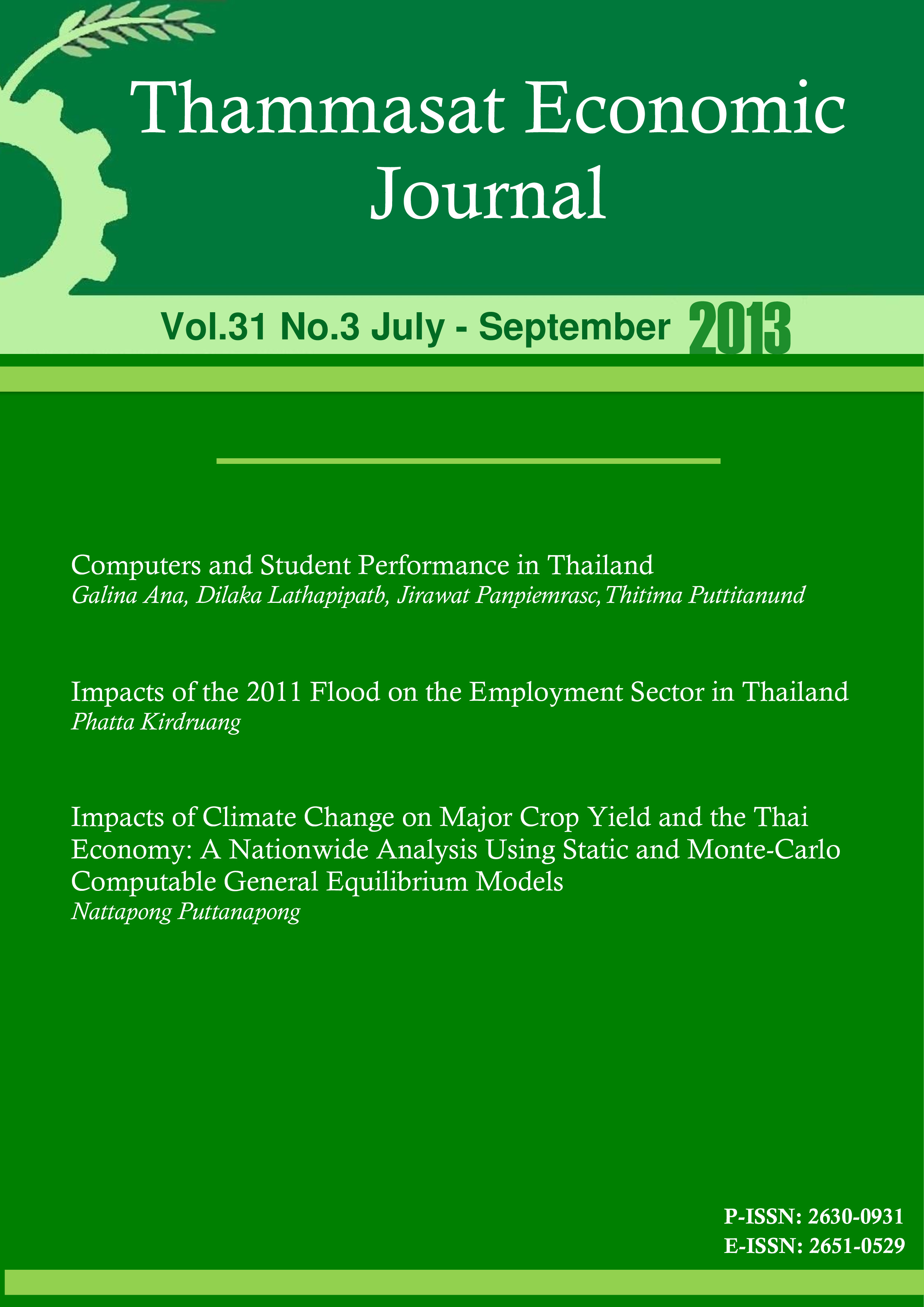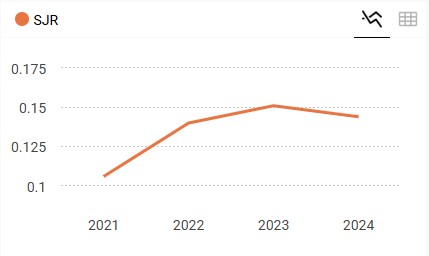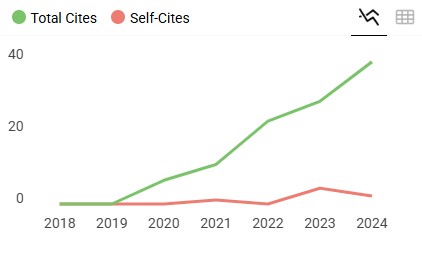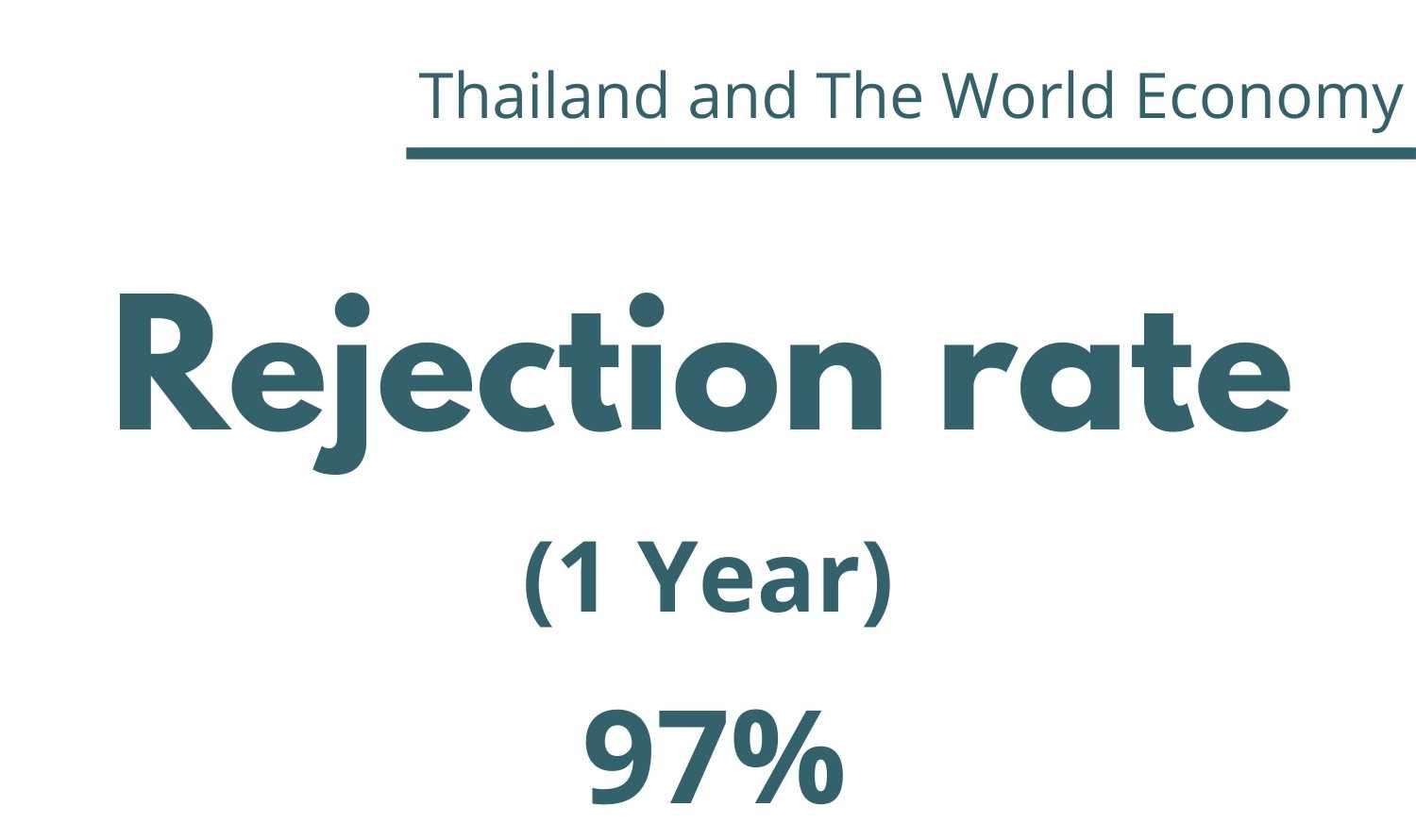Computers and Student Performance in Thailand
Keywords:
computer use, student performance, PISA, ThailandAbstract
This paper examines the effects of computer use at home and in the classroom on students’ performance in Thailand, as measured by science, mathematics, and reading scores available in the 2009 OECD Programme for International Student Assessment (PISA). We find that the impact of using computers at home depends on the type and the intensity of computer activities. Playing games excessively can reduce students’ performance scores in science subject, while frequent browsing of the Internet for schoolwork has a positive impact on students’ achievement. We do not find any positive effects on the examination scores from computer use in the classroom. In fact, students who used computers in their classes performed significantly worse than those who did not. Our results raise doubts regarding the effectiveness of the Thai government’s policy to increase students’ performance via providing schools with Internet and computers. Apparently more work is needed in finding the right approach to make computers a more effective educational tool in the classrooms.
References
Banerjee, Abhiit V., Shawn Cole, Esther Duflo, and Leigh Linden. 2007. “Remedying Education: Evidence from Two Randomized Experiments in India,” The Quarterly Journal of Economics 122(3), 1235-1264.
Barrera-Osorio, Felipe and Leigh L. Linden. 2009. “The Use and Misuse of Computers in Education: Evidence from a Randomized Experiment in Colombia,” Policy Research Working Paper No.4836. The World Bank.
Bratti, Massimiliano, Daniele Checchi and Antonio Filippin. 2007. “Territorial Differences in Italian Students’ Mathematical Competencies: Evidence from PISA 2003,” IZA Discussion Papers 2603, Institute for the Study of Labor (IZA).
Cox, Margaret, Chris Abbott, Mary Webb, Barry Blakeley, Tony Beauchamp and Valerie Rhodes. 2003. “ICT and Attainment,” ICT in Schools Research and Evaluation Series No.17. British Educational Communication and Technology Agency.
Cuban, Larry. 1993. “Computers Meet Classroom: Classroom Wins,” Teachers College Record 95(2), 185-210.
The Economist. 2012. “Let them eat tablets: Trying to stop the rot in Thailand’s schools by giving out tablet computers,” Bangkok: The Economist, June 16th 2012. http://www.economist.com/node/21556940
Fuchs, Thomas and Ludger Woessmann. 2004. “Computers and Student Learning: Bivariate and Multivariate Evidence on The Availability and Use of Computers At Home and At School,” CESIFO Working Paper NO.1321. Category 4: Labour Markets.
Glewwe, Paul, and Michael Kremer. 2006. “Schools, Teachers, and Education Outcomes in Developing Countries,” Handbook of the Economics of Education, Vol. 2 (Eric A. Hanushek and Finis Welch, Eds.). Elsevier.
Glewwe, Paul, Eric Hanushek, Sarah Humpage, and Renato Ravina. 2011. “School Resources and Educational Outcomes in Developing Countries: A Review of the Literature from 1990 to 2010,” NBER Working paper #17554.
Hanushek, Eric A. 2008. “Education Production Functions,” The New Palgrave Dictionary of Economics (Steven N. Durlauf and Lawrence E. Blume, Eds.). Basingstoke: Palgrave Macmillan.
Harrison, Colin, Chris Comber, Tony Fisher, Kaye Haw, Cathy Lewin, Eric Lunzer, Angela McFarlane, Diane Mavers, Peter Scrimshaw, Bridget Somekh, and Rob Watling. 2002. “ImpaCT2: The Impact of Information and Communication Technologies on Pupil Learning and Attainment,” ICT in Schools Research and Evaluation Series No.7. British Educational Communication and Technology Agency.
Inamdar, Parimala. 2004. “Computer skills development by children using ‘hole in the wall’ facilities in rural India,” Australian Journal of Education Technology 20(3), 337-350.
The Institute for the Promotion of Teaching Science and Technology. 2009. “The quality of Learning of Thai Students: Analysis of PISA 2006 and TIMSS 2007”. The Institute for the Promotion of Teaching Science and Technology (in Thai language).
Kirkpatrick, Heather and Larry Cuban. 1998. “Computers Make Kids Smarter- Right?,” Technos Quarterly 7(2) [http://www.technos.net/tq_07/2cuban.htm].
Kulik, James A. (2003) Effects of using instructional technology in elementary and secondary schools: What controlled evaluation studies say. Arlington, VA: SRI International.
http://www.sri.com/policy/csted/reports/sandt/it/Kulik_ITinK-12_Main_Report.pdf
Lai, Fang, Renfu Luo, Linxiu Zhang, Xinzhe Huang, and Scott Rozelle. 2012a. “Does Computer-Assisted Learning Improve Learning Outcomes? Evidence from a Randomized Experiment in Migrant Schools in Beijing,” Rural Education Action Project Working paper #228, Stanford University.
Lai, Fang, Linxiu Zhang, Yaojiang Shi, Matthew Boswell, and Scott Rozelle. 2012b. “Computer Assisted Learning as Extracurricular Tutor? Evidence from a Randomized Experiment in Rural Boarding Schools in Shaanxi,” Rural Education Action Project Working paper #235, Stanford University.
Lai, Fang, Linxiu Zhang, Qinghe Qu, Xiao Hu, Yaojiang Shi, Matthew Boswell, and Scott Rozelle. 2012c. “Does Computer-Assisted Learning Improve Learning Outcomes? Evidence from a Randomized Experiment in Public Schools in Rural Minority Areas in Qinghai, China,” Rural Education Action Project Working paper #237, Stanford University.
Linden, Leigh. 2008. “Complement or Substitute? The Effect of Technology on Student Achievement in India,” Working Paper No.17, 2008.The World Bank.
Mo, Di, Johan Swinnen, Linxiu Zhang, Hongmei Yi, Qinghe Qu, Matthew Boswell, and Scott Rozelle. 2012. “Can One Laptop per Child Reduce the Digital Divide and Educational Gap? Evidence from a Randomized Experiment in Migrant Schools in Beijing,” Rural Education Action Project Working paper #233, Stanford University.
National Center for Educational Statistics. 2001. The nation’s report card: Mathematics 2000. Washington, D.C.: National Center for Educational Statistics.
OECD. 2009. PISA Data Analysis Manual SPSS, Second Edition. Paris: OECD
Rangvid, Beatrice S. 2007. “School Composition Effects in Denmark: Quantile Regression Evidence from PISA 2000,” Empirical Economics, 33(2), 359 – 388.
Rosas, Ricardo, Miguel Nussbaum, Patricio Cumsille, Vladimir Marianov, Monica Correa, Patricia Flores, Valeska Grau, Francisca Lagos, Ximena Lopez, VeronicaLopez, Patricio Rodriguez, and Marcela Salinas. 2003. “Beyond Nintendo: design and assessment of educational video games for first and second grade students,” Computers & Education 40, 71-94.
Rouse, Cecilia E., Alan B. Krueger, and Lisa Markman. 2004. “Putting Computerized Instruction to the Test: A Randomized Evaluation of a “Scientifically-based” Reading Program,” Economics of Education Review 23, 323-338.
Siamwala, Ammar, Somkiat Tangkitvanich, and Dilaka Lathapipat. 2011. “Revamping Thai Education System: Quality for All,” TDRI Year End Conference Paper, Thailand Development Research Institute.
Vejjajiva, Suranand. 2011. “Can PC tablets solve our education woes?” Bangkok: Bangkok Post, September 9th, 2011. http://www.bangkokpost.com/opinion/opinion/255674/can-pc-tablets-solve-our-educational-woes.
Wenglinsky, Harold. 1998. “Does it compute? The relationship between educational technology and student achievement in mathematics,” Policy Information Report, Educational Testing Service Policy Information Center.
Woessmann, Ludger. 2001. “Why Students in Some Countries Do Better,” Education Matters, 1(2), 67-74.
Yang, Yihua, Linxiu Zhang, Junxia Zeng, Xiaopeng Pang, Fang Lai, and Scott Rozelle. 2012. “Computers and the Academic Performance of Elementary School-Aged Girls in China’s Poor Communities,” Rural Education Action Project Working paper #238, Stanford University.










